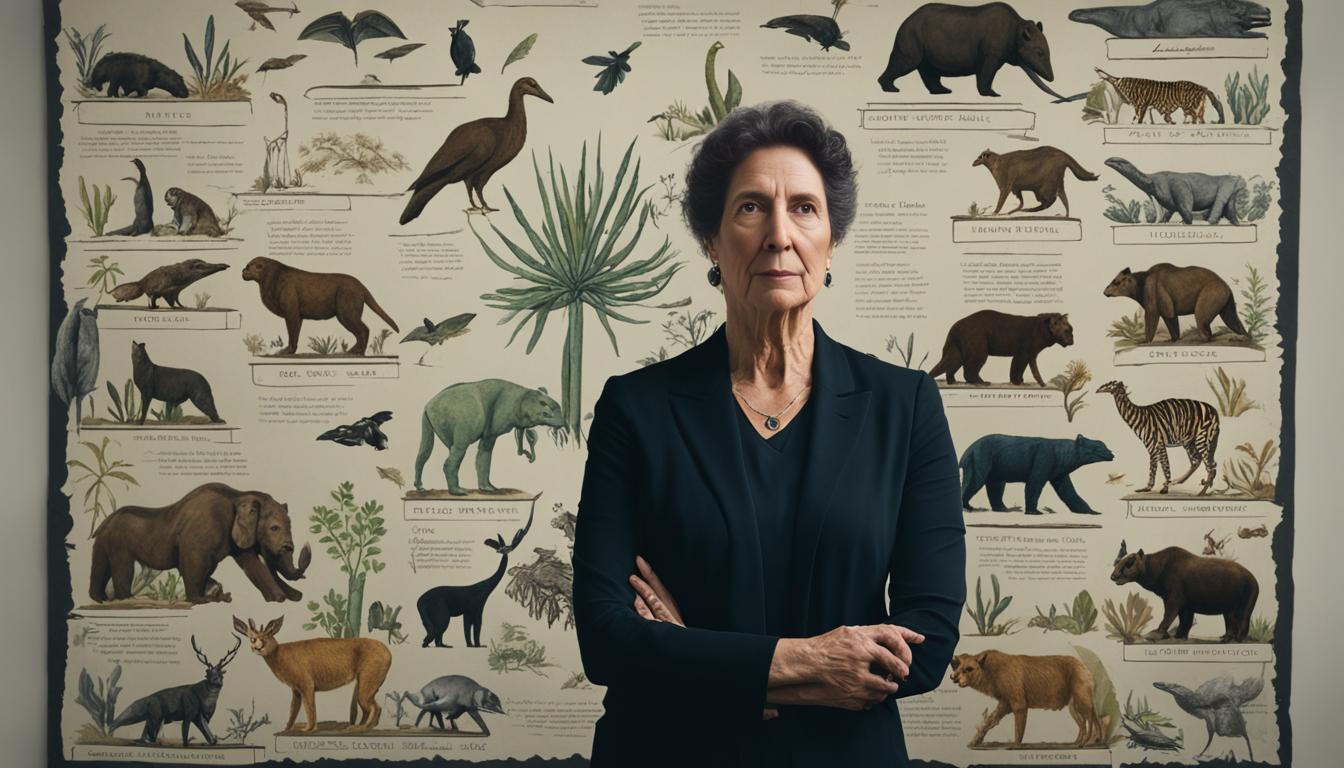If you’re an avid audiobook listener looking for your next informative and thought-provoking listen, allow us to introduce “The Sixth Extinction” by Elizabeth Kolbert. This audiobook review will delve into the work of the Pulitzer Prize-winning journalist and her in-depth exploration of how humans have affected the natural world.
Throughout this review, we’ll examine the audiobook format, scientific accuracy, writing style, and themes explored in “The Sixth Extinction.” We’ll also take a look at the critical reception of the book and offer our own final thoughts and recommendations. Dive into the world of Elizabeth Kolbert’s research and insights, as we analyze the impact of her work through this in-depth audiobook review.
About the Author
Elizabeth Kolbert is an American journalist and author. She was born in New York City in 1961 and graduated from Yale University with a degree in literature. Kolbert is a staff writer at The New Yorker magazine, where she has worked since 1999. She has written extensively about environmental issues and has received numerous awards for her work.
Kolbert is the author of several books, including “Field Notes from a Catastrophe: Man, Nature, and Climate Change” and “The Sixth Extinction: An Unnatural History.” Her writing is well-researched, insightful, and engaging, making her an authority in the field of environmental journalism.
Book Synopsis
“The Sixth Extinction” by Elizabeth Kolbert chronicles the ongoing crisis of mass extinction. The book explores the history of five major extinctions in the past and the current unprecedented extinction event caused by human activities. Kolbert argues that humans are the primary cause of the current extinction crisis and highlights the devastating consequences that come with losing biodiversity. She draws on the research of biologists, geologists, and other scientists to present a compelling case for why we need to take action to protect the planet’s ecosystems.
Throughout the book, Kolbert visits diverse locations, from Panama to Iceland, to witness the impact of human activities on ecosystems. She investigates the causes of extinction, including climate change, habitat destruction, and disease. “The Sixth Extinction” explores how each of these factors contributes to the crisis and what can be done to mitigate them. Kolbert also delves into the ethical and moral implications of mass extinction and the responsibility that humans have to the planet.
Kolbert’s work is a comprehensive study that combines scientific research, storytelling, and investigative journalism. It presents a sobering assessment of the current state of the planet and emphasizes the urgency of taking action to prevent further damage. “The Sixth Extinction” is a thought-provoking and informative read that challenges readers to reevaluate their relationship with the natural world and take steps to protect it.
Audiobook Format
Listening to “The Sixth Extinction” in audiobook format enhances the reading experience for individuals who prefer auditory learning and storytelling. The narration style of the audiobook is engaging and captures the attention of the listener throughout the production, making it a compelling and immersive experience.
The quality of the audio production is exemplary, with crisp and clear sound that ensures the listener does not miss any essential details. The narrator does an excellent job of conveying the author’s message, creating a vivid and realistic interpretation of the text.
“The narrator brought the book to life. It was like listening to an expert storyteller, taking me on a journey through the book page by page.”
Furthermore, the performance of the narrator is top-notch, adding to the audiobook’s overall quality. The narrator’s voice and tone create a sense of authenticity that amplifies the power of the storytelling.
Table of Audiobook Format:
| Aspect | Details |
|---|---|
| Narration Style | Engaging, immersive, and captivating |
| Audio Production Quality | Clear, detailed, and rich sound |
| Performance of the Narrator | Top-notch, adds authenticity to the storytelling |
Scientific Accuracy
Scientific accuracy is crucial when discussing topics as complex and important as biodiversity loss and climate change. In “The Sixth Extinction,” Elizabeth Kolbert extensively researched the subject matter, providing a wealth of facts and figures to support her arguments. The book draws on multiple sources, including interviews with scientists and experts in the field, to provide a comprehensive analysis of the current state of the planet and the impact of human activity on ecosystems.
The scientific accuracy of “The Sixth Extinction” is further evidenced by the numerous awards and accolades it has received, including the Pulitzer Prize for general nonfiction. The book’s research, data analysis, and presentation of scientific facts are meticulously researched and are presented in an accessible and engaging way, making it easy for listeners to understand the complex concepts presented.

“Kolbert’s reporting is rigorous, she writes beautifully, and her arguments are compelling – this book is destined to become an instant classic.”
The Impact of Human Activity
Kolbert’s research confirms the urgent need for action to mitigate the effects of climate change and biodiversity loss. The book provides a sobering account of the damage inflicted on the planet by human activity and serves as a call to action for individuals, governments, and organizations to take swift and decisive action in addressing this global crisis.
Writing Style
Elizabeth Kolbert’s writing style in “The Sixth Extinction” is commendable. She employs clear and concise prose that effectively conveys complex scientific concepts in an engaging manner. Kolbert employs storytelling techniques to contextualize data, making it easier for readers to understand the broader implications of the research presented.
“The Sixth Extinction is scholarly yet accessible, an engaging blend of observation, explanation, and speculation.”
Throughout the book, Kolbert’s writing style provides a compelling narration that immerses the reader in the story. Her vivid descriptions of the natural world and depictions of species on the brink of extinction elicit emotional responses from the reader, making the book a powerful call to action.
Impact on the Reader
Kolbert’s writing style resonates with readers as it effectively communicates the urgency of the book’s message. The narrative style and vivid storytelling create a sense of immersion, transporting readers to the various locations described in the book. Kolbert’s use of pathos inspires readers to take action to prevent further biodiversity loss and climate change.
Themes Explored
“The Sixth Extinction” delves into a variety of themes and ideas related to biodiversity loss, climate change, and human impact on ecosystems. Elizabeth Kolbert provides a thorough examination of the science behind these phenomena, exploring their causes and potential consequences. Throughout the audiobook, listeners will encounter numerous thought-provoking concepts, such as the impact of historical extinctions and their relevance to present-day issues.
The audiobook also touches on the future of the planet and how current decisions are shaping it. It addresses the potential for human intervention and takes a critical look at the consequences of inaction. There are also discussions on the role of humans in preserving the planet, as well as the challenges and opportunities that lie ahead.
One of the main themes explored in the audiobook is the interconnectedness of life on Earth. Kolbert highlights the complex relationships between species and ecosystems, and how the loss of one can have far-reaching consequences for all. The audiobook also tackles larger sociopolitical issues, such as the impact of consumerism on the planet and the need for systemic change.
Overall, “The Sixth Extinction” offers a compelling exploration of pressing environmental issues and their wider implications. Through its storytelling and thorough research, the audiobook provides a comprehensive look at the complex challenges facing our planet.
Biodiversity Loss Table
| Examples of species impacted by human activity | Causes of biodiversity loss |
|---|---|
| Amphibians, such as the golden toad of Monteverde | Deforestation and habitat destruction |
| Birds, such as the dodo bird of Mauritius | Overhunting and predation by introduced species |
| Mammals, such as the black rhinoceros of Africa | Pollution and climate change |
“…human beings have so far not been particularly friendly to other species, but it’s not too late for us to decide to change that…”
Engaging Narration
The audiobook version of “The Sixth Extinction” captivates listeners with its engaging narration and captivating storytelling. The narrator expertly conveys the author’s message, painting a vivid picture of the impact of human actions on the planet’s delicate ecosystems. The audiobook’s cohesive and well-paced delivery ensures that listeners remain invested in the narrative until the very end.
“The Sixth Extinction’s” audiobook version is a true masterpiece in narration. The captivating storytelling kept me invested in the narrative from beginning to end, making it a truly enjoyable experience.
The narration’s ability to engage listeners in the book’s themes and ideas has undoubtedly added to its overall success. Audiences who are looking for a powerful and thought-provoking audiobook should certainly consider “The Sixth Extinction” as a must-listen option.
Impactful Moments
Elizabeth Kolbert’s “The Sixth Extinction” is filled with powerful moments that leave a lasting impact on the reader. One such moment occurs when the author visits a frog-breeding facility in Panama to witness the fight against the deadly chytrid fungus. The description of the fungus’ effects on the helpless amphibians is both chilling and heartbreaking.
Another memorable scene takes place in the Great Barrier Reef, where Kolbert witnesses the coral bleaching that results from rising temperatures and ocean acidification. The author’s vivid descriptions of the once-vibrant ecosystem now reduced to a pale, lifeless shadow of itself is a stark reminder of the devastating impacts of climate change.
Finally, towards the end of the book, Kolbert visits the Harvard Museum of Natural History, where she comes face-to-face with the preserved remains of the extinct passenger pigeon. The author’s poignant reflection on the tragic fate of this once-thriving species, which was hunted to extinction by humans in the early 20th century, is a poignant reminder of our power to shape the future of the planet.

These impactful moments and others like them make “The Sixth Extinction” a deeply moving and thought-provoking work that is sure to stay with readers long after they have finished listening to the audiobook.
Critical Reception
“The Sixth Extinction” has received widespread critical acclaim since its publication. The book has been widely reviewed, and most critics have praised its scientific accuracy, engaging narration, and thought-provoking themes.
“Kolbert’s book is a tour-de-force of environmental writing…The Sixth Extinction is destined to become a classic in the genre.” – The New York Times Book Review
Many reviewers have praised Kolbert’s ability to present complex scientific concepts in an accessible and engaging way.
“Kolbert’s writing is clear and concise, and her storytelling is captivating. She brings to life the science behind the drama of our planet’s dying species.” -National Public Radio
Some critics have noted that the book can be heavy on information, but this has not diminished their overall appreciation for the work.
| Publication | Review Excerpt |
|---|---|
| The New Yorker | “Elizabeth Kolbert’s new book is a clear-eyed accounting of the terrifying scope of the biodiversity crisis.” |
| The Guardian | “Kolbert’s masterpiece… A sobering and powerful call to action.” |
| Washington Post | “This is an important and timely book, a firsthand report from the frontlines of an unprecedented catastrophe.” |
The critical reception of “The Sixth Extinction” suggests that this audiobook is a must-read for anyone concerned about the future of our planet. Its engaging narration, scientific accuracy, and thought-provoking themes make it a powerful exploration of the sixth extinction event and our role in its unfolding.
Comparison to Other Works
“The Sixth Extinction” stands out among other books in the same genre due to its unique focus on the impact of human activity on the planet’s biodiversity. However, it shares similarities with other titles such as “Silent Spring” by Rachel Carson and “The World Without Us” by Alan Weisman, which also delve into the consequences of human actions on the environment.
| Similarities | Differences | |
|---|---|---|
| “The Sixth Extinction” | – Focuses on human impact on biodiversity – Analyzes current extinction rates – Emphasizes the importance of conservation efforts |
– Written from a journalistic perspective – Covers a wider scope of time periods |
| “Silent Spring” | – Explores the impact of pesticides on the environment – Addresses the need for environmental regulations – Utilizes scientific research to support claims |
– Focuses primarily on chemical pollution – Written from a more academic perspective |
| “The World Without Us” | – Examines the impact of human disappearance on the environment – Considers the possibility of the earth recovering from human impact – Explores the interconnectedness of ecosystems |
– Written from a more speculative perspective – Covers a wider variety of scenarios |
In comparison to these related titles, “The Sixth Extinction” stands out for its journalistic approach, passionate writing, and detailed research.
Takeaways and Reflections
After experiencing “The Sixth Extinction,” it is clear that Elizabeth Kolbert’s book is a powerful reminder of the fragile state of our planet. The author’s research and reporting are convincing, leaving no doubt that we are in the midst of a human-made crisis of epic proportions.
One of the biggest takeaways from this book is the urgent need for change. Kolbert’s ability to deliver complex scientific concepts in a compelling way is a testament to her skill as a writer. The book’s accessible nature makes the content all the more effective in inspiring thought and action in its readers.
The author’s use of storytelling to convey facts and information is impactful, and the personal impact of this book is undeniable. Through vivid storytelling and compelling prose, Kolbert has created a work that is both informative and thought-provoking.
“The Sixth Extinction is a sobering reminder of the damage that we have wrought upon this planet, but it also offers hope for a brighter future. This book is a must-read for anyone who cares about the state of our world.”
In conclusion, “The Sixth Extinction” is a vital piece of work that should be read by anyone who wants to understand the severity of the climate crisis. The book’s personal impact and thought-provoking themes will stay with readers long after they have finished it.
Recommendation and Final Thoughts
Elizabeth Kolbert’s “The Sixth Extinction” is an audiobook that every listener should experience. With her expert research and captivating storytelling, Kolbert delivers a powerful and thought-provoking message about the impact of human activity on our planet’s biodiversity.
The narrator’s engaging performance brings the content to life and keeps the listener invested from start to finish. The audiobook’s scientific accuracy and profound themes make it a must-listen for anyone interested in environmentalism or the future of our world.
Overall, I highly recommend “The Sixth Extinction” audiobook to all listeners. It is a sobering yet enlightening work that will leave a lasting impact and spark important conversations about our responsibilities as inhabitants of earth.
Conclusion
In conclusion, “The Sixth Extinction” by Elizabeth Kolbert is a well-researched and thought-provoking audiobook that explores the impact of human activity on the planet’s ecosystems. Kolbert’s writing style is clear and engaging, making complex scientific concepts accessible to a broad audience. The narration is expertly performed, holding the listener’s attention throughout the audiobook.
This audiobook is highly recommended for anyone interested in environmental issues, biodiversity loss, and the future of the planet. Its message is timely and important, and it challenges listeners to reflect on their own impact on the planet and what actions they can take to make a positive change.



